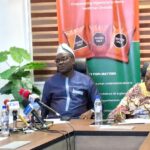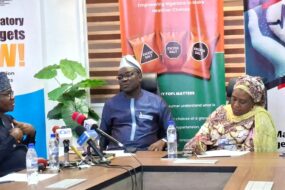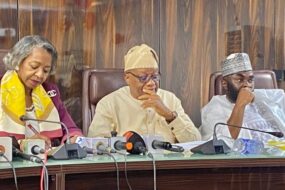
By Dan-Maryam Zayamu
The former Commissioner for Health in Lagos State, Dr. Jide Idris, has advised healthcare workers in the country to get involved in politics, if not, the health sector will continue to witness a lot of challenges.
Dr. Idris gave the advice at a symposium organised by the Healthcare Transformation Coalition (HTC) with the theme: ‘Repositioning the healthcare sector: Creating the pathway to an effective health system’, in Abuja, weekend.
He revealed that the coalition is a professional group which is to support the implementation of policies and also to support political agenda in the health sector.
Dr. Idris who is the convener of the symposium explained that the HTC was brought together to be able to advice the in-coming government appropriately on the right approach to take in building the health sector.
He said that “over the years, healthcare professionals have always reacted to health policies. The government set policies then we start reacting, if we don’t want the policies may be we start going on strike.
“We feel this time around, we should be involved in setting the health agenda because at the end of the day, health is very body’s business. Government has a role, professionals have a role and individuals have a role to play.
“Over the years, we always believe that government knows everything, that is not correct. Government are human beings, they are not healthcare professionals. So it is left for us the professionals to show the direction and tell them what to do or what we want done.
“Over the years, people shy away from this. We cannot get a good health sector if we don’t play the politics. This is essentially why we are here.”
He disclosed that the symposium was organised as part of many activities, one;, according to him, “is to mobilise all health workers, friends, colleagues in getting them to be very political.
“We all have our candidates. Every body knows my candidate, I work in Lagos State. My candidate is Asiwaju Tinubu. I am not going to hide it. Among all the candidates, he is the best because he has experience.
“He may not know it all. If something goes wrong, it will fall back on the professionals, now is the time to be proactive.
“This symposium is part of the activities and to look at the APC manifesto which coincides with all the challenges in the health sector. This time around, we will not complain, we will not grumble, we need to proffer concrete solutions in the context of what is happening in the environment.
“We have different stakeholders, different specialists in all aspects, let them come out with concrete solution so that we can articulate and pass on to the next government.”
Dr. Idris further said that at the end of the symposium, “we are going to collate all the suggestions and give to the in-coming government.
“As a coalition, our work has not finished, we need to work again towards the implementation of these things. We need to create a force to ensure that these things are implemented. That is our role.”
On her part, the former Commissioner for Health, Borno State, Dr. Salma Anas Kolo, disclosed that when Kashim Shetima was governor of Borno state, he transformed the health sector despite the fact that the Boko Haram crisis was at its peak.
She noted that a lot can be learnt from the Borno experience and used to transform the health sector in the country.
According to her: “Borno state was an epicenter of crisis when Shetima was governor but he did everything possible to revamp and rebuild the health system.
“There is much we can learn from what Shetima did in Borno state because the leadership was resilient and resources was dedicated to capacity building of health workers including training of indigenous health workers who are back now and working in the health system in the state.
“A lot can be seen in terms of leadership as of that time. Community and religious leaders were also involved that time in mobilizing and promoting healthcare services among the citizens.
“We were able to have a very resilient health system even though the crisis was still there.
“Another challenge that was prevalent during the peak of the crisis in Borno was gender based violence. Safe spaces were built and those who were sexually abused were provided psycho social counselling and treatment.
“There are a lot of lessons that we can learn from the Borno experience during the time of Gov Shetima in the health sector and replicate in the country without wasting much time.”
Responding to questions from Journalists, the Secretary of the HTC, Dr. John Okoh, said that all healthcare disciplines were represented from the 36 states of the federation and other members from Diaspora.
He explained that: “What we have is that, for the first time, the health family coming under one roof.
“We want to take the destiny into our hands, we want to ensure that health is given priority, we want to ensure we are not just reactive but participate in policy formation, we want to ensure that we drive the process so that we can actually monitor and evaluate the outcome.”
He, however, noted that the: “The coalition still has a lot to do. We will do mentoring for the younger ones, the coalition is aimed at instilling participatory discipline in every healthcare personnel.
“This coalition has come to stay, it will ensure that it makes government accountable in the health sector and we will keep monitoring and evaluating the outcome.”

















One reply on “2023: Get involved in politics for better medicare — Ex-Lagos Health Comm tells colleagues”
I don’t think the title of your article matches the content lol. Just kidding, mainly because I had some doubts after reading the article.